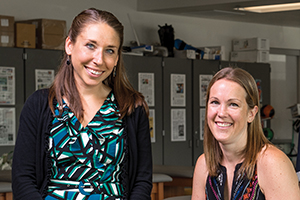November 23, 2015
Duo’s research project to boost healthy lifestyles and student opportunities

And perhaps what they enjoy most is the active engagement of students in research. This opportunity, they argue, is experiential learning at its best, gives SVSU students a competitive edge for grad school acceptance, and enhances students’ confidence, communication and critical learning skills.
“Focus on Faculty” spoke to Baruth, assistant professor of health sciences, and Schlaff, assistant professor of kinesiology, about a recent research project they oversaw.
What prompted this research project?
MB: We have similar interests in looking at physical activity and healthy eating, so it was easy for us to get together and decide on a project that was evidence-, intervention- and community-based.
BS: Ultimately, we want to develop our own behavioral intervention program through original research. That will happen next thanks to a grant from the Allen Foundation Student/Faculty Research Grant, where we will look at developing a behavioral intervention program for pregnant women that addresses both diet and activity.
Describe the intent of the current project, “Improving Health Behaviors Among Older Adults.”
MB: We worked with inactive adults over age 50 to develop strategies that addressed eating better and exercising more.
BS: Much of the time with our participants was discussion-centered, talking about goal setting, self-monitoring and also creating an environment for social support.
How did the SVSU students benefit?
MB: Three students actually led the research. They coordinated finding participants, led measurement and education sessions, worked one-on-one with participants and entered data.
BS: I love the fact that one of the things they learned is that research isn’t perfect and there is value in failure. Our students get to be engaged and do work at the undergraduate level that is often seen at the graduate level.
We asked the three students involved with the SVSU project to discuss their experience. All noted it was Baruth and Schlaff’s passion and mentoring that gave them confidence and clarity. This put them on a well-planned path to graduate school.
Nathan Peters, 2015, B.S., is enrolled in a Ph.D. program in exercise science at the University of South Carolina. Ultimately, he hopes to perform research and teach at the college level. This is what he had to say:
Dr. Schlaff helped me see that I could do research and teaching rather than either/or, as I love them both. Dr. Baruth talked in class about her own research at University of South Carolina and it was just what I wanted. My advisor at USC said that most applications just offer basic GRE and ACT scores but my vitae read like someone with a master’s degree.
Tatum Goldufsky, 2015, B.S., is enrolled in Michigan State University’s Master of Human Nutrition with a full graduate assistantship. Goldufsky also plans to become a registered dietitian, pursue a Ph.D., perform research and teach at the college level. This is what Goldufsky had to say:
I talked a lot to Dr. Baruth, who helped me see I could marry my passions for community-based health, nutrition, physical activity and teaching. Dr. Schlaff sparked my interest in MSU. Both faculty members knew I was very shy and pushed and challenged me. I am where I am because of them.
Valerie Adams, 2015, B.S., is enrolled in the Doctor of Physical Therapy program at Duke University. Ultimately, she plans to open a physical therapy clinic and specialize in women’s health. This is what Adams had to say:
Dr. Schlaff gave me the courage to approach her because she made it clear in class that she cared about us as people. So, after class, I introduced myself and learned we had a mutual interest in nutrition. She encouraged me in my research efforts and became my honors thesis advisor. The skills I gained from research ranged from learning to look at the big picture to communications, developing an inquisitive view, confidence, working with all members of a team and taking things in stride. For sure, these experiences helped my acceptance into Duke.
